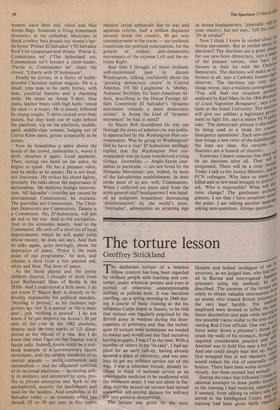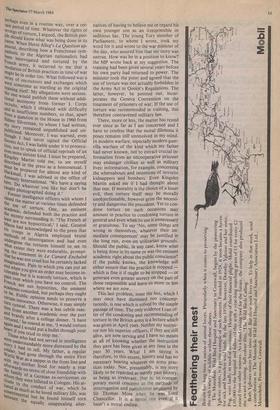The torture lesson
Geoffrey Strickland
The deliberate torture of a helpless fellow creature has long been regarded by civilised people with loathing and con- tempt, under whatever pretext and even in pursuit of otherwise unexceptionable military or judicial ends. It was therefore startling, on a spring morning in 1949 dur- ing a course of basic training' at the In- telligence Corps depot in Sussex, to be told that torture was regularly practised by the British army in wartime during the inter- rogation of prisoners and that the techni- ques of torture were techniques we needed to master and would one day find ourselves having to apply. 1 was 17 at the time. With a number of others in my 'in-take', I had ap- plied for an early call-up, having already secured a place at university, and was anx- ious to get my military service out of the way. I was a reluctant recruit, already in- clined to think of national service as an unavoidable medicine to be swallowed with the minimum delay. I was not alone in fin- ding that the lecture on torture had turned somewhat self-pitying distaste for military life into positive disapproval.
The lecture was given by the most
likeable and indeed intelligent of our in structors, as we judged him, who had„se;se ed. in Burma and interrogated Jaw., o' prisoners using the methods be -„.°,0$ described. The purpose of the torture ';.,0 solely to obtain valuable information ffrot an enemy who treated British prisoners the very least harshly. The inet,,,110- e. mployed were devised to inflict the,', mum discomfort and pain while leaving few possible traces visible to the eyes of it visiting Red Cross official. One way "laps cl force water down a prisoner's throat ward is strain the walls of his stomach, thougitv`o, required considerable practice and Another was to hold him near a hot st`'.0, And one could simply beat him up, hick first wrapped him in wet blankets, i/.':,bit would reduce the risk of externally vis' bruises. There have been worse tortures ° musty, but these seemed bad enough' oc. During the years that followed I mad casional casional attempts to draw public aLLw„ to the training I had received, especiallid it seemed, from talking to others who the served in the Intelligence Corps, illa,t„rv, training had been given fairly regt11°' Perhaps even in a routine way, over a cer- wPeriod of time. Whatever the rights or wrongs of torture, I argued, the British peo- Ple should know what was being done in its nme. When Herni Alleg's La Question ap- Peared, describing how a Frenchman sym- bPathetic to the Algerian nationalists had een interrogatedand tortured by the h army, it occurred to me that a revelation of British practices in time of war might be in order too. What followed was a series of encounters and exchanges which were sometime as startling as the original training itself. My allegations were serious. No one would publish them without addi- tional testimony from former I. Corps recruits, which I obtained with difficulty from in insufficient numbers, so that, apart Irorn a question in the House in 1960 from Sidney Silverman, to whom I had written, rtlY story remained unpublished and un- Publicised. Moreover, I was warned, even `3othougeh I had never signed the Official ctets Act, I was liable under it to prosecu- tion, not to speak of official reprisals of an even more sinister kind. I must be prepared, ICingsleY Martin told me, to see myself described in the press as a homosexual. I must be prepared for almost any kind of blackmail I was advised in the office of here nesty International. 'We have a saying
owhatever you like but don't be caught photographed doing it.'
raFormer intelligence officers with whom I sed the matter at various times defended e use of torture. One, an eminent academic, defended both the practice and the secrecy surrounding it. 'The French at least are not hypocritical,' I said. General his Nlassu trohad acknowledged to the press that ops in Algeria employed brutal Methods of inierrogation and had even "dergone the tortures himself to see to %vhat extent they were endurable, prompt the comment in Le Canard Enchaine at he was not cruel but he certainly lacked 'lnagination. Pain to which you can put an end When You give an order may become in- Polerable but it is scarcely torture, which is w,hin over which you have no control. The ench are not hypocrites, the eminent tocadernic conceded, but perhaps they ought be. Public opinion needs to preserve a certain innocence. Otherwise, it may simply nitrn eYnical. There was a less subtle reac- sm from another academic over the port ant d brandy after a college dinner. `I have ,,i3rtured,' he roared at me, 'I would torture 4. gain and I would put a bullet through your heart if you tricd to stop me.' Iv Those who had not served in intelligence ,.,ere understandably more distressed by the soldier had to tell. My father, a regular World' had gone through the entire First wiii, War as a sapper in the front line and with IrtY mother lived for nearly a year th'enNards on terms of close friendship with whe fatrtilY of a German ex-serviceman on tit:011 they were billeted in Cologne. His at- hat e to the conduct of war, which he tin at- hated as much as he loved military life, was tsentiMental but he found himself torn beweeo the equally unappealing alter-
natives of having to believe me or regard his own younger son as an irresponsible or seditious liar. The young Tory member of Parliament, to whom I wrote, took my word for it and wrote to the war minister of the day, who assured him that my story was untrue. How was he in a position to know? the MP wrote back at my suggestion. The training had been given several years before his own party had returned to power. The minister took the point and agreed that the use of torture was not actually forbidden in the Army Act or Queen's Regulations. The latter, however, he pointed out, incor- porates the Geneva Convention on the treatment of prisoners.of war. If the use of torture was recommended in training, this therefore contravened military law.
There, more or less, the matter has rested ever since as far as I am concerned and I have to confess that the moral dilemma it poses remains still unresolved in my mind. In modern warfare, especially modern guer- rilla warfare of the kind which my father had never known, not to extract crucial in- formation from an uncooperative prisoner may endanger civilian as well as military lives: information, for example, concerning the whereabouts and intentions of terrorist kidnappers and bombers. Even Kingsley Martin asked me if I had thought about that one. If morality is the choice of a lesser evil, then torture itself may be morally unobjectionable, however grim the necessi- ty and dangerous the precedent. Yet to con- done torture on such occasions may amount in practice to condoning torture in general and even when its use is unnecessary or gratuitous. To say 'No, some things are wrong in themselves, whatever their im- mediate consequences' may be justified in the long run, even on utilitarian grounds. Should the public, in any case, know what is being done in its name or was the eminent academic right about the public conscience? If the public knows, the knowledge will either ensure that the practice is stopped which is fine it if ought to be stopped — or generate even greater secrecy on the Part of those responsible and leave us more or less where we are now.
This last problem, none the less, which I may once have dismissed too contemp- tuously, is one which is solved by the simple passage of time. The only evidence I can of- fer of the condoning and recommending of torture in the British army is a lecture which was given in April 1949. Neither my instruc- tor nor his superior officers, if they are still alive, are now serving and I have no means at all of knowing whether the instruction they gave has been given at any time in the past 30 years. What I am saying is therefore, to this extent, history and has no necessary bearing whatever on army prac- tices today. Nor, presumably, is my story likely to be regarded as merely past history; as being as irrelevant, that is, to contem- porary moral concerns as the methods of interrogation and punishment employed by Sir Thomas More when he was Lord Chancellor. It is a moral iale even if it hasn't a moral ending-















































 Previous page
Previous page